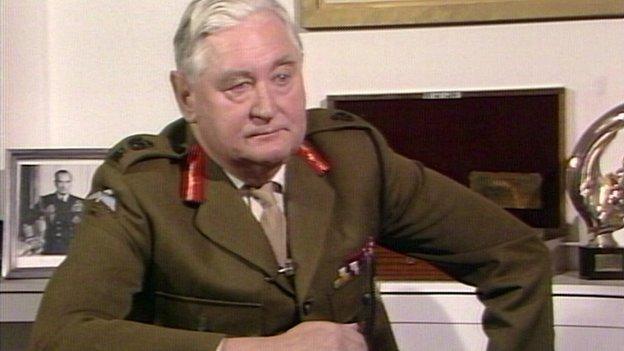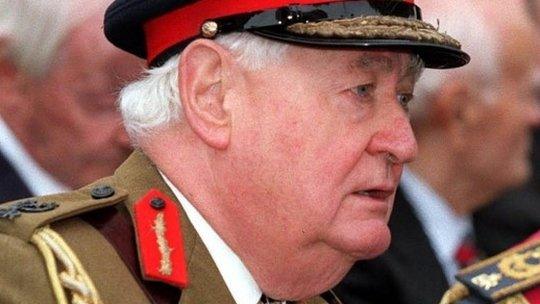Lord Bramall: Ex-army head calls for Met Police review
- Published
Lord Bramall: "I just don't see how a level-headed policeman could believe one word of it"
Former head of the Army Lord Bramall has called for the Metropolitan Police to review the way it handles claims of historical sex abuse.
Last month he found out he would not face any further action in connection with allegations he was part of a VIP paedophile ring.
The peer, 92, told the BBC detectives told him little about the claims and did not investigate them properly.
The Met Police said it would not comment on the case in detail.
Last March, Lord Bramall's home was raided by Operation Midland police officers, who were investigating abuse allegations dating back to the 1970s and 1980s made by a man given the name Nick.
'Level-headed'
Police told Lord Bramall he faced seven abuse allegations, including taking part in abuse on Remembrance Day and supervising the torture of an unspecified number of boys at various locations.
Lord Bramall, a Normandy veteran who retired from the House of Lords in 2013, strongly denied the claims.
In January, he was notified by letter that he would face no further action.
In his first broadcast interview since that letter, Lord Bramall has accused the police of failing to speak to witnesses who cast doubt on Nick's claims until 10 months after they first heard the allegations.
"I just don't see how a level-headed policeman could believe one word of it - without corroboration which he did not bother to get," Lord Bramall told BBC Radio 4's The Report.
"It was I who had to prove that I couldn't have done it."

Who is Lord Bramall?

Lord Bramall spoke to the BBC on his retirement from the armed forces in 1985
Lord Bramall served during the D-Day landings during World War Two and commanded UK land forces between 1976 and 1978.
He became chief of the general staff - the professional head of the Army - in 1979, and in 1982 he oversaw the Falklands campaign.
Later that year he became chief of the defence staff, the most senior officer commanding the UK's armed forces.

Pool party
On first hearing the allegations against him, Lord Bramall said: "If it hadn't been so serious, I felt like roaring with laughter.
"When the man is a field marshal, he's [hardly] likely to choose Remembrance Sunday to have a sex party."
He also told how one policeman asked if he could swim.
"I said, 'Yes, I can swim' and I saw his face light up. So you can swim - you must be halfway to a sex pool party!"
Reporter Alistair Jackson, who conducted the interview, said he was able to track down potentially key witnesses in a few days, yet the police did not speak to them for at least six months. He said they have still not spoken to Nick's ex-wife.
He also highlighted how one allegation was made at a period when Lord Bramall's life was "incredibly heavily monitored" - every meeting, every phone call was listened in to by another army officer, Sir Peter Duffell.
Sir Peter told Alistair Jackson he "never, ever saw a boy enter Lord Bramall's office".
The Met said Operation Midland was still investigating other aspects of Nick's claims and would not comment while the inquiry was ongoing.
It said: "It is worthy of note that at the very outset of an investigation into allegations of non-recent abuse, detectives will assess the allegations through a process involving extended questioning of the complainant as well as background checks to understand their history."
The force said officers had searched Lord Bramall's home after obtaining a warrant.
The Met added: "The media reporting on cases of this kind is necessarily incomplete because it does not have access to all the work carried out by detectives in the course of an investigation, and the public should be aware of that."
It has confirmed that an internal review of the operation was carried out last summer on the orders of Assistant Commissioner Pat Gallan.
- Published20 January 2016

- Published16 January 2016
